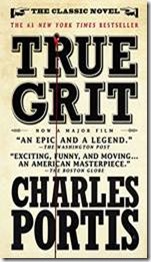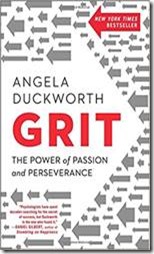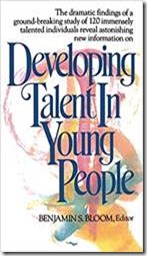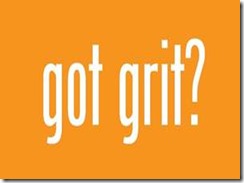 True grit! Charles Portis introduced us to it in his classic novel, and John Wayne brought it to life in the film by the same name: an aging, hard-drinking U.S. Marshal is hired by a young girl to bring her father’s killer to justice because that marshal has “true grit.” How does she know? He’s tenacious and undaunted by obstacles, has a longstanding passion for his work, and persists until the job is done. The pursuit of the killer is complex and dangerous, as these things often are – and, yes, the marshal gets his man!
True grit! Charles Portis introduced us to it in his classic novel, and John Wayne brought it to life in the film by the same name: an aging, hard-drinking U.S. Marshal is hired by a young girl to bring her father’s killer to justice because that marshal has “true grit.” How does she know? He’s tenacious and undaunted by obstacles, has a longstanding passion for his work, and persists until the job is done. The pursuit of the killer is complex and dangerous, as these things often are – and, yes, the marshal gets his man!
True grit makes for a great story and blockbuster movie. Turns out, it also makes for top performance and a very successful life.
 Psychologist, researcher, and MacArthur “genius” grant winner, Angela Duckworth, has done ground-breaking work on what leads to high achievement. Her book, Grit, offers a refreshing look at the issues, and her findings should encourage us all!
Psychologist, researcher, and MacArthur “genius” grant winner, Angela Duckworth, has done ground-breaking work on what leads to high achievement. Her book, Grit, offers a refreshing look at the issues, and her findings should encourage us all!
The secret to world-class achievement, according to Duckworth, is not talent, genetic make-up, or high IQ. Focused, passionate, and purposeful persistence makes the difference – and that’s a strategy open to anyone.
Our culture is obsessed with genius and natural talents, but you can’t be distracted by that. You need to look behind great work and see its true origin. Hard work! Effort, according to Duckworth’s research, is twice as valuable as talent or genetics in explaining extraordinary outcomes.
 Even Einstein attributed his success to it: “It’s not that I’m so smart, it’s just that I stay with problems longer.”
Even Einstein attributed his success to it: “It’s not that I’m so smart, it’s just that I stay with problems longer.”
Elizabeth Gilbert tackles it in her liberating treatise, Big Magic: Creative Living Beyond Fear, and calls it her “stubborn gladness” – get up, get going, keep working, keep learning, and do it all with unending curiosity and joy. Focusing on the journey is way more important than the destination!
To be clear, having talent is an asset! Natural talents can start you on a road to discover your deep passions and get you far. Talent also offers a clue to how quickly you will learn and master the basics of a new skill or interest.
But talent alone won’t get you to the top of your game. For that, you need grit.
Duckworth has isolated three important components of grit: passion, persistence, and purpose. Let’s look into all three. Each has subtle features beyond the everyday meaning of the words. You’ll want to understand those and add them to your bag of life and career tricks.
Passion: Passion at the heart of high achievement is multi-dimensional. It is part personal interest – we are always willing to work at things that we enjoy and feel good about. It is also sustained attention, rooted in our experiences, and deepened and developed over time through intentional effort and connections.
This kind of passion is life-orienting. It takes time to find and nurture – and it will ebb and flow. No one feels passionately inspired or clear in direction every day. The trick is to identify an interest that you are willing to invest your amazing energies in – maybe something you keep returning to again and again in your dreams or choices – and get working. And work hard!
 You may have found your daemon – your life’s calling. If that’s true, strengthen and put it to good use. Maybe you haven’t. That’s OK, too. At least you’ll have learned something new about yourself, the world, and how to build a sound work ethic – all of which will serve you well in your continuing search.
You may have found your daemon – your life’s calling. If that’s true, strengthen and put it to good use. Maybe you haven’t. That’s OK, too. At least you’ll have learned something new about yourself, the world, and how to build a sound work ethic – all of which will serve you well in your continuing search.
Benjamin Bloom’s edited collection, Developing Talent in Young People, illustrates three stages of skill development and suggests how you can find and nurture your own passion over a lifetime. Each stage outlines different activities and supports needed to progress. Bloom labels the stages as early, middle, and later years.
Duckworth sees each stage informing one of her three vital components of grit: early years focus largely on discovering one’s passion, the middle years on persistence and how to learn, and later years are a time to broaden one’s personal interests with larger social meaning and purpose.
So, let’s begin at the beginning. How are lifelong interests found? How do they transform into life-guiding passions?
Early stage skill development is a playful taste of life and its possibilities – a time to discover and test possible interests and to develop some basic mastery. This developmental work is helped along by supportive others, exposure to new and multiple experiences, and opportunities for autonomous experimentation and fun happenings. At its core, the early stage is a relaxed discovery of self and of areas you might want to more deeply embrace. Individuals progress with the help of encouraging teachers, mentors, and coaches. The activities are enjoyable and individually rewarding. And you’ll get enough experience under your belt to make an informed decision about whether to commit or move on to something else.
A good way to understand this stage is to think about sampling a variety of sports or musical instruments so you can decide which you’d like to spend more time playing.
Persistence: Middle stage is the time for “deliberate practice,” not just more of the same approach used earlier for basic mastery. This is the real deal in skills development – and a stage I wish I had understood more clearly years ago!
There is an old Japanese saying that roughly translates as fall seven, rise eight. “Deliberate practice” embodies that ethic.
You will need tenacity, perseverance, and willpower to sustain your skill improvement in the face of frustration, obstacles, fears, tedium, and setbacks. In fact, if things are going too smoothly, you may not be challenging yourself or practicing deliberately enough. You can expect basic satisfaction and pleasure from improving your skill – even moments of ecstasy and “flow”[1] when something comes together suddenly or in new ways. Those, however, can be few and far between.
“Deliberate practice” is not glamorous: it is roll-up-your-sleeves determination and toughing-it-out through plenty of monotonous repetition for the sake of learning and improvement. Think about the talented Chicago Bulls player Michael Jordan spending hours and hours alone in the gym shooting foul shots!
“Deliberate practice” has a very specific set of rules, and they go something like this:
1. Isolate a skill area that is a current challenge for you. Pick a small part of the larger whole and make it something foundational for success or progress. An aspiring concert pianist, for example, might choose a passage in a piece that requires unusual left hand agility and speed; a basketball player, shooting three pointers from the left corner line; a writer, a strong query letter; and so on.
2. Set and clearly define a stretch goal. Perhaps you want to play the piano passage without mistake daily on a first try for a week, or shoot 60% during every basketball practice for a month.
3. Give the chosen goal your full concentration and work, work, work on it.
4. Figure out where you are falling short and fix that. Be pleased with what you are doing well; however, more importantly, be proactive and seek feedback from experts about what you are doing wrong. If not, you’ll solidify bad habits and hardwire your brain for current weaknesses.
5. Continue the cycle of repetition with reflection, feedback, and refinement. Work as long as you need on your one, chosen skill.
6. Identify when you have reached your stretch goal, set another, and begin the “deliberate practice” cycle again on your new chosen flat spot.
Neuroscience explains why “deliberate practice” works. Humans are born with a vast potential to develop in response to environmental challenges. To over-simplify, it all has to do with the myelin sheaths that insulate your nervous system and allow any part of the body – brain, abs, biceps, etc. – to develop in response to intensive use, deliberate experiences, and repetitive practice. Mother was right: practice makes perfect!
Purpose: Personal interests take on new meaning and purpose when they contribute to the well-being of others and the world in Bloom’s later stage of development. We are hardwired as social beings, and human survival has always depended on the work of many. All of Duckworth’s “gritty” high achievers saw their personal passions mature into something useful to the world which fueled their efforts further.
Music, for example, fosters global understanding and peace to superstar cellist YoYo Ma. Anthropologist Margaret Meade studied South Pacific island culture, yet her autobiography describes her work as bringing new understandings of human behavior and gender to the world. Sister Helen Prejean’s ministry to the poor included becoming a pen pal with a convicted killer, sentenced to die in the electric chair. Her learning from that relationship led to a book, Dead Man Walking, that took her humble death row ministry to the world stage.
And I could go on, but you get the point. There is exhilaration, increased motivation, and sheer beauty in finding the sweet spot where one’s life passion contributes to a larger good!
 Got grit? You don’t need to be a household name – or even aspire to fame – to do great things that matter to the world or those around you. You just need to know what you really want to do and get on with it – and work with focus, determination, persistence, and passion!
Got grit? You don’t need to be a household name – or even aspire to fame – to do great things that matter to the world or those around you. You just need to know what you really want to do and get on with it – and work with focus, determination, persistence, and passion!
You have everything you need to succeed within you. Don’t let fear or false beliefs about genes or talent or anything else hold you back.
The world is your oyster when you apply your true grit.
I have no doubt that you have greatness within – and the true grit needed to set it free. Do you? So, what will your contribution be?
[1] M. Csikszentmihalyi (1990). Flow: The Psychology of Optimal Experience. New York: HarperCollins.

